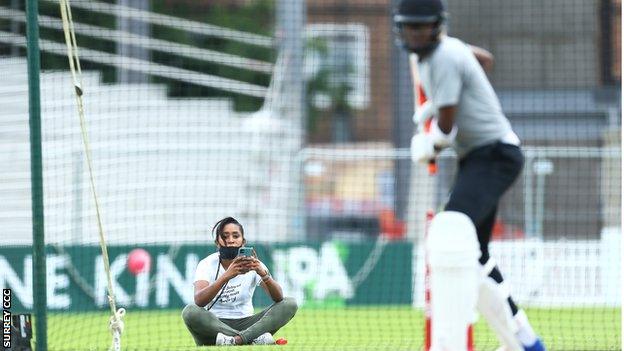ACE Programme: Surrey scheme to become independent charity
- Published

Former England international Ebony Rainford-Brent was instrumental in the foundation of the ACE Programme
Surrey's African Caribbean Engagement Programme (ACE) will become an independent charity after receiving £540,000 from Sport England.
Launched in January, the scheme handed scholarships to 25 young players.
It will now be rolled out across London and Birmingham, with the target to include three more cities.
Chair of the charity Ebony Rainford-Brent, the first black woman to play for England, said: "This is about opening doors which have been shut."
Speaking on BBC Radio 5 Live Breakfast, Rainford-Brent explained: "Cricket hasn't really built community programmes into inner city areas which serve the black community and some other lower socio-economic communities.
"There's not enough work done to build a pathway into the professional game.
"Also, there was a bit of a falling-out in the mid-90s. Grounds like The Oval used to see crowds from the local British West Indian community.
"Then things like musical instruments were taken away. Things such as that created a disconnect and it hasn't really been re-engaged.
"We see part of our work as not only to find talent but to try re-engaging a community that did have a love for cricket and still does. We want to inspire the black community back to cricket."
Rainford-Brent, who was part of the England squad that won the World Cup in 2009, is now Surrey's director of women's cricket
She was instrumental in the foundation of the ACE Programme, which had the aim of tackling a 75% decline in cricket participation by members of the black community.
Speaking to BBC Sport, she added: "I almost ended up in tears when I saw the kids training at The Oval this summer.
"If you know what it feels like to have doors shut on you, to be able to do something about it is powerful."
Seventy young players attended trials in March, the scholars then taking part in training and matches across the summer. One went on to represent Surrey Under-18s.
The ACE Programme was founded before the advent of the Black Lives Matter movement, which spurred discussions about English cricket's attitude towards fighting racism.
In June, ex-England batsman Michael Carberry - who played for four counties including Surrey - said that racism was "rife" in the sport, with the England and Wales Cricket Board (ECB) in July announcing a range a measures aimed at strengthening inclusion and diversity. The ECB has also given a grant to the ACE Programme.
Fan Tales: 'Girls don't have same opportunities as boys in cricket'
"We are aware that the BAME community has fewer opportunities, less access to activities and fewer pathways in the game," said Rainford-Brent.
"I got a one-off opportunity to play through a charity coming into my school, but it always stayed with me that there were 50 kids there who loved the game but didn't get the chance to play."
Of the ACE Programme's 25 scholars, only two were girls, a trend reflecting the fact that the England women's team has only ever been represented by four BAME players.
"There is a lot more work to do to encourage black females to get involved in our sport and that has so many layers to it," said Rainford-Brent. "We have to let young, black females know that cricket can be a sport for them.
"You could see society represented in the men's team that won the World Cup, but the women's team is miles away."
The announcement of the foundation of the ACE charity comes as October's Black History Month draws to a close.
"We have been celebrating black history and culture, but we still have work to do," added Rainford-Brent.
"It's a reminder of everything we have seen come up this year and the light that has been shone on our game."
Fan Tales: Khairo on black British role models in cricket

Rugby Union Weekly: The Premiership review, a Six Nations preview and Eddie Jones
Americast: All you need to know as the US election day nears
